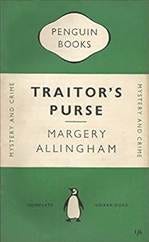Which Is the What of the I and the Me, Part 2
In which I discuss my favorite books of an even more sub-genre than the last post...
Last time, I discussed my love for the ‘Who am I, really?” theme in books: specifically, the Person One taking over the role of Person Two scenario, with varying degrees of success—the people doing the taking over, I mean, and not me. I hope. This time, I’m going to talk about what I consider an offshoot of the theme: a person waking up with amnesia and being immediately plunged into danger and excitement while struggling to keep up, find out stuff, and stay alive. Let’s call it Person One struggling to play the role of, well, Person One.
I’m a big fan of classic mysteries and one of my favorite writers in this field is Margery Allingham, often listed with Dorothy L. Sayers and Agatha Christie as one of the Queens of Classic Crime. Allingham had a long-running series about her detective Albert Campion, from the late 1920s to well after World War II; the series is still ongoing with a different writer. My favorite book in the series is TRAITOR’S PURSE. Albert often comes across in his early adventures as how he’s described more than once, a silly ass. Being a mystery, this façade just covers his real brilliance. But he does mature, and TRAITOR’S PURSE slams him slap into the Second World War. Not the battlefields-and-weapons war, but the secret, subversive war.
A man wakes in hospital with his head bandaged and no memory of who he is—just an intense feeling that he’s got to stop something seriously bad or England will lose the war. Also, he suspects he may have murdered someone. He blunders around, all his friends depending on him, while he gradually figures stuff out. And, more importantly, who he is. Oh, and he’s pretty sure he’s lost the love of his life by being what he suspects was his usual, silly-ass self. It’s a good story, where the detective IS the mystery.
Another favorite writer of mine is Manning Coles. Adelaide Manning and Cyril Coles collaborated on a series of light-hearted—well, the first one was pretty intense—clever and snarky spy stories about Thomas Elphinstone Hambledon. Tommy pops up first in DRINK TO YESTERDAY—the intense one—then reappears in A TOAST TO TOMORROW.
Right before the end of World War One, a man is rescued from a burning German ship with the inevitable head wound. He’s wearing a high-ranking military uniform so gets sent to a Berlin hospital, wakes up with the inevitable amnesia and is sent out to the world. The Great War ends, he goes through the bad times and gets involved with a guy called Adolf Hitler—he doesn’t like the little creep, but he knows Germany needs a leader. After a few years, our amnesiac ends up as the Chief of Police in Berlin. Cue the Reichstag fire, which brings up a stressful moment in his past. The Chief of Police remembers who he is: Tommy Hambledon, a British agent. Woohoo, he thinks, this is wicked cool—well, he thinks it in much more 1930s British slang terms, like ‘By Jove!’ or some such. And he spends the rest of the book messing with England’s secret service while he works to take down Adolf and his buddies. I love this book and all the Hambledon stories.
By far my favorite amnesia stories is Roger Zelazny’s first book in his ten-volume epic fantasy series THE CHRONICLES OF AMBER. I know every self-respecting fantasy reader knows this series by heart but bear with me.
Book one is NINE PRINCES IN AMBER. A man wakes in hospital—are we sensing a theme here?—with no memory of who he is or why he’s there. Luckily, his underlying subconscious sneakiness keeps him just barely in front of destruction as he lies to his captors and, later, his siblings. See, Carl Corey is really Corwin, a Prince of Amber. And Amber is the real world, of which Earth and all the other worlds are mere shadows.
Corwin manages to find a way to get his memories—all his memories—back and plunges into all sorts of other endeavors. This is volume one of a 10-part series, after all, though Corwin’s son shows up and starts taking some of the weight. But I love the way Zelazny shows us how, even with no memory, Corwin’s original, sneaky, manipulative, clever personality is there, submerged but still directing his actions. Who are we without our memories? Corwin, for one, is the same person he is with his memories.
I don’t need to tell you what a brilliant writer Zelazny is, and I really like his other works, LORD OF LIGHT especially. But NINE PRINCES was my introduction to him, and I fell on it with glee when I recognized how the concept derived from some of my earlier favorite books.
I’m pretty sure amnesia would suck, but it makes for great storytelling.







